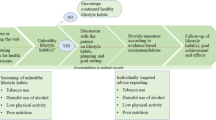Abstract
Aim of the study: A participatory action research study design was developed and tested in 40 Danish internship pharmacies as part of a 3-year study supported by the Research Centre for Quality in Medicine Use. The aim of the study was to create a foundation for improving the quality of counselling practice in pharmacies by comparing the pharmacy staff's views on, knowledge of and behaviour towards a specific patient group with the knowledge, perceptions and medication use of the same patients. Method: Pharmacy students in their fourth year collected data for the study. In 1999, the students carried out 123 qualitative interviews with angina pectoris patients and collected 569 questionnaires from pharmacy staff in 40 internship pharmacies. Results: The results indicate that discrepancies exist between the patients' and pharmacy staff's perspectives on important issues such as knowledge about medicines (patients)/provision of information about medicines (pharmacy staff), experienced side effects (patients)/information about side effects (pharmacy staff), knowledge on prevention and lifestyle (patients)/information on lifestyle and prevention (pharmacy staff) and expectations of pharmacies (patients)/initiatives started in pharmacies (pharmacy staff). Conclusion: The study gives reason to believe that angina pectoris patients might benefit if pharmacies provided more information on the relationship between lifestyle factors and angina pectoris, the possible side effects of medicines and the function of medicines.
Similar content being viewed by others
References
Britten N. Lay views of drugs and medicines: orthodox and unorthodox accounts. In: Williams SJ, Calnan M, editors. Modern medicine-lay perspectives and experiences. London: UCL Press; 1996:48-73.
Calnan M. Health and illness-the lay perspective. London, New York: Tavistock Publications; 1987.
Fallsberg M. Reflections on medicines and medication-a qualitative analysis among people on long-term drug regimens. Linköping Studies in Education. Dissertations 1991; 31.
Hansen EH, Launsø L. Drugs and users-problems and new directions. Health Promotion 1988;3(3):241-8.
Timm HU. Patienten i centrum? Brugerundersøgelser, lægperspektiver og kvalitetsudvikling. [Is the focus on the patient? User study, user perspective and quality improvement]. DSI Danish Institute for Health Services Research and Development; 1997. DSI report 97.06.
Airaksinen M, Vainio K, Koistinen J, Ahonen R, Wallenius S, Enlund H. Do the public and pharmacists share opinions about drug information. International Pharmacy Journal 1994; 8(4):168-70.
Hassell K, Noyce P, Rogers A, Harris J, Wilkinson J. Advice provided in British community pharmacies: what people want and what they get. J Health Ser Res Policy 1998;3(4):219-25.
Stevenson FA, Barry CA, Britten N, Barber N, Bradley CP. Doctor-patient communication about drugs: the evidence for shared decision making. Soc Sci Med 2000;50:829-40.
Salmon P, Peters S, Stanley I. Patients' perceptions of medical explanations for somatisation disorders: qualitative analysis. BMJ 1999;318:372-6.
Adamsen L, Tewes M. Discrepancy between patient perspectives, staff's documentation and reflections on basic nursing care. Scandinavian Journal of Caring Sciences 2000;14(2):120-9.
Klasen H, Goodman R, Goodman R. Parents and GPs at cross-purposes over hyperactivity: a qualitative study of possible barriers to treatment. Brit J Gen Prac 2000;50:199-202.
Cornwall A, Jewkes R. What is participatory research? Soc Sci Med 1995;41(12):1667-76.
Anon. Managing care of angina patients in the community: a model of good pharmacy practice. International Pharmacy Journal 1998;12 Suppl IV:2-4.
Churton M. Theory and method. London: Macmillan Press Ltd; 2000.
Fallsberg M, Herborg HH, Væggemose U. How asthma patients think and act. Internal report. Pharmakon, Denmark; 1998.
Viney L, Westbrook M. Coping with chronic illness: Strategy preferences, changes in preferences and associated emotional reactions. J Chron Dis 1984;37(6):489-502.
Antonovsky A. Unravelling the mystery of health. San Francisco: Jossey-Bass; 1987.
Lisper L, Isacson D, Sjödén PO, Bingefors K. Medicated hypertensive patients' views and experience of information and communication concerning antihypertensive drugs. Patient Education and Counselling 1997;32:147-55.
Pharmakon. Forebyggelse af lægemiddelrelaterede problemer gennem apotekets ældre service. [Prevention of drugrelated problems through the pharmacy's elder service project]. 1997. Report.
Schaefer M. Basic principles for a coding system of drug-related problems: PI-Doc. Abstract at the International Working Conference on Outcome Measurements in Pharmaceutical Care; Pharmaceutical Care Network Europe January 26-29. Pharmakon, Danish College of Pharmacy Practice, Denmark; 1998.
Kvale S. Interviews-an introduction to qualitative research interviewing. Copenhagen: Hans Reitzels Forlag; 1996.
Enger K. NSDstat For Windows 95/98NT. Norsk samfundsvidenskabelig data-tjeneste, [The Norwegian social science data service]; 1999.
The European Society of Cardiology. Management of stable angina pectoris-recommendations of the task force of the European Society of Cardiology. European Heart Journal 1997;18:394-413.
Cooper AF. Whose illness is it anyway? Why patient perceptions matter. Int J Clin Pract 1998;52(8):551-6.
FIP. International guidelines for good pharmacy practice. The International Pharmaceutical Federation. Tokoy; 1993.
Morgall JM, Almarsdóttir AB. The new consumer-implications for pharmacy. Int J Pharm Pract 1999;7:198-201.
Tully MP, Hassell K, Noyce P. Advice-giving in community pharmacies in the UK. J Health Serv Res Policy 1997;2:38-50.
Bedford SE. Patient-focused care: Good in theory, bumpy in practice. Clinical Laboratory Science 1995;8:263-8.
Rovers JP, Currie JD, Hagel HP, McDonough RP, Sobotka JL. A Practical Guide to Pharmaceutical Care. APhA (American Pharmaceutical Association), 1998.
Author information
Authors and Affiliations
Corresponding author
Rights and permissions
About this article
Cite this article
Haugbílle, L.S., Westh Sírensen, E., Gundersen, B. et al. Basing pharmacy counselling on the perspective of the angina pectoris patient. Pharm World Sci 24, 71–78 (2002). https://doi.org/10.1023/A:1015575731203
Issue Date:
DOI: https://doi.org/10.1023/A:1015575731203



